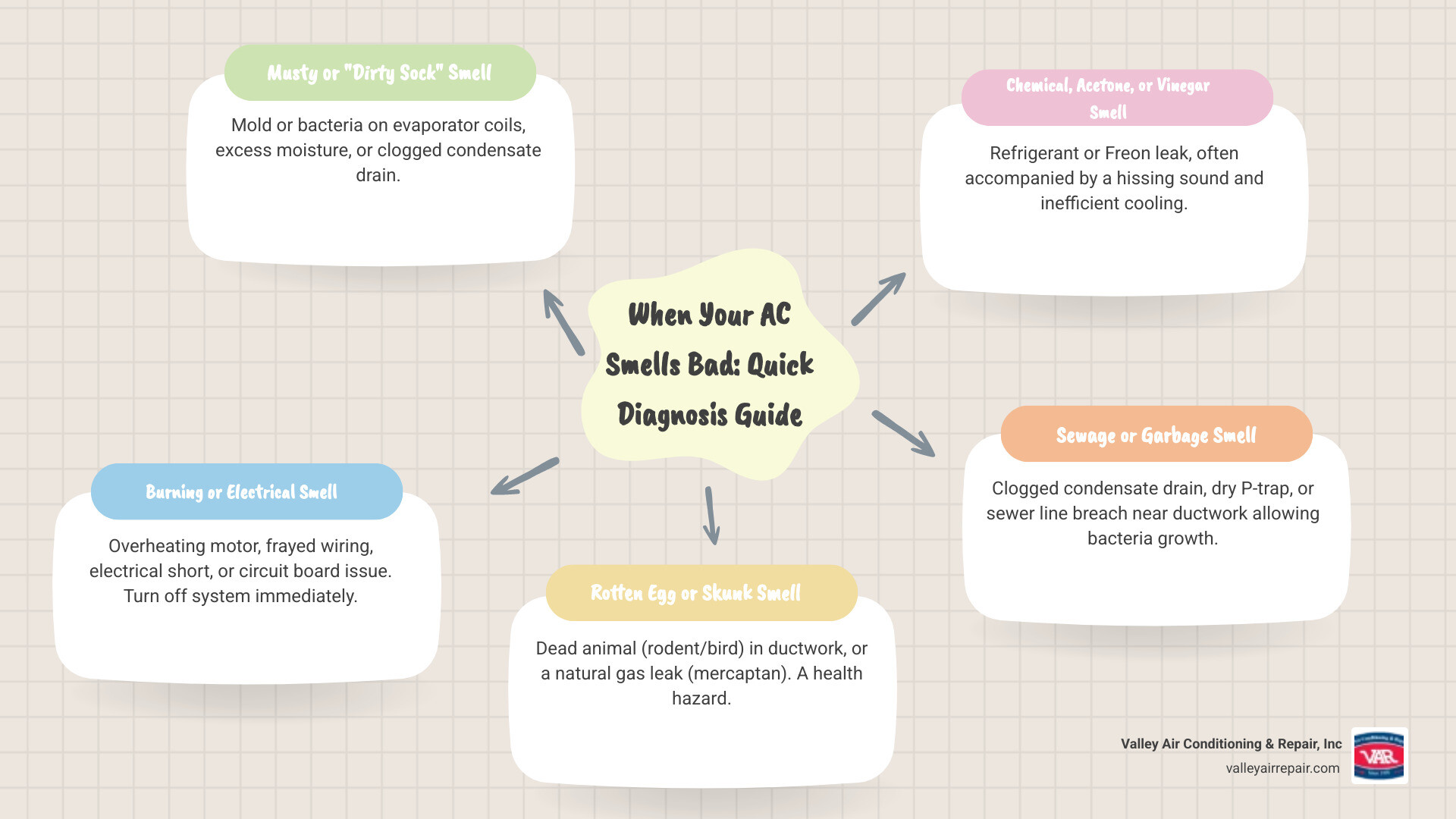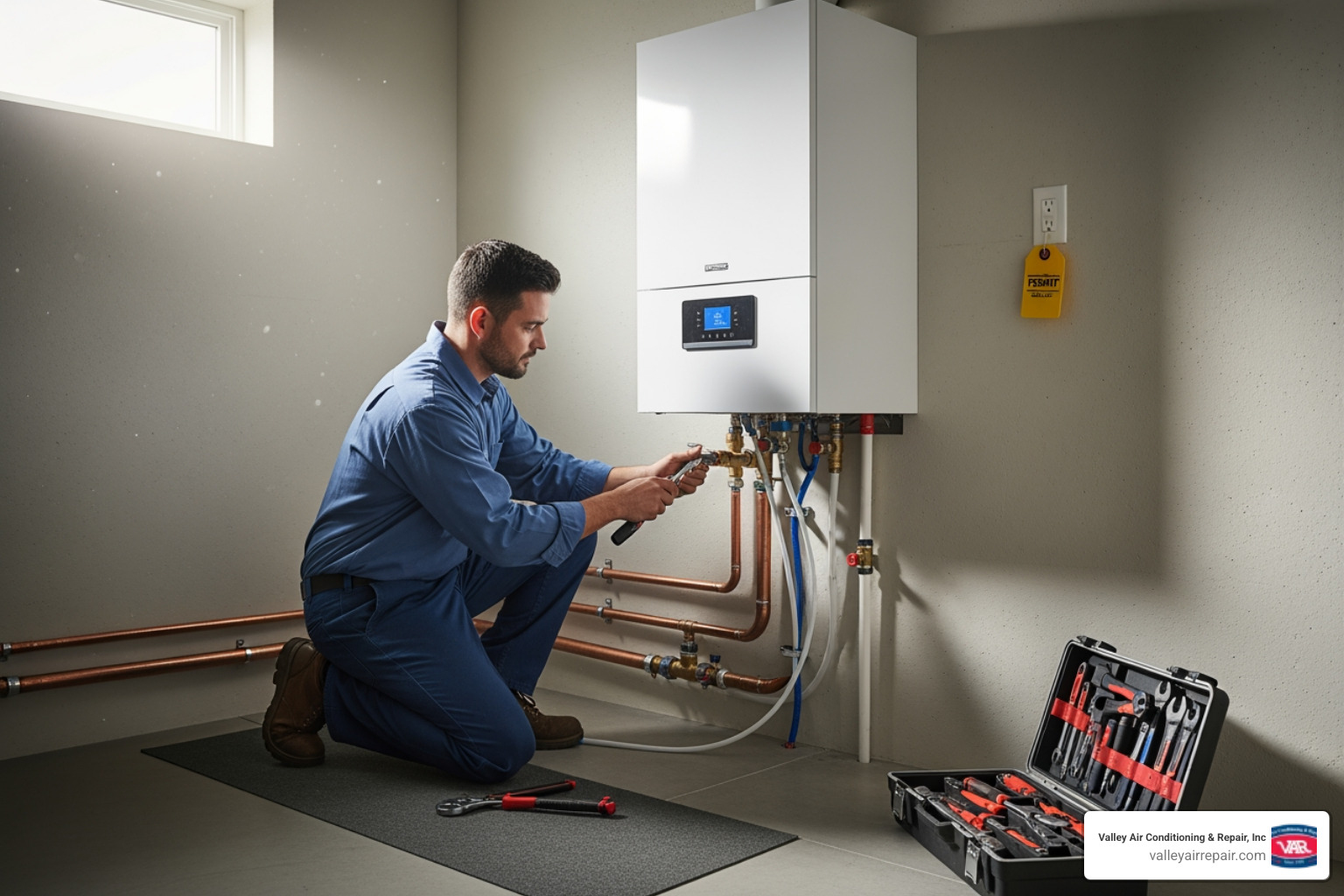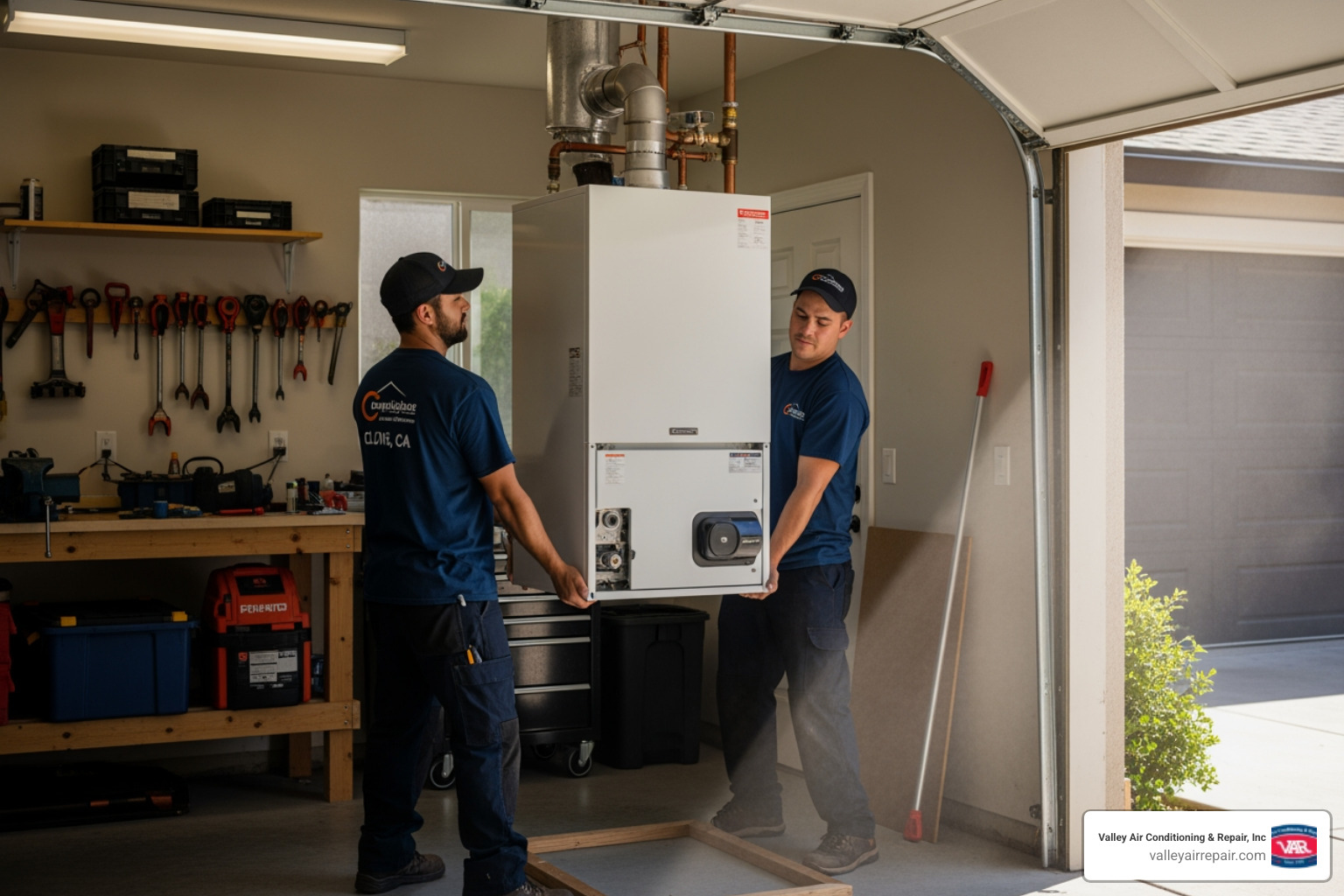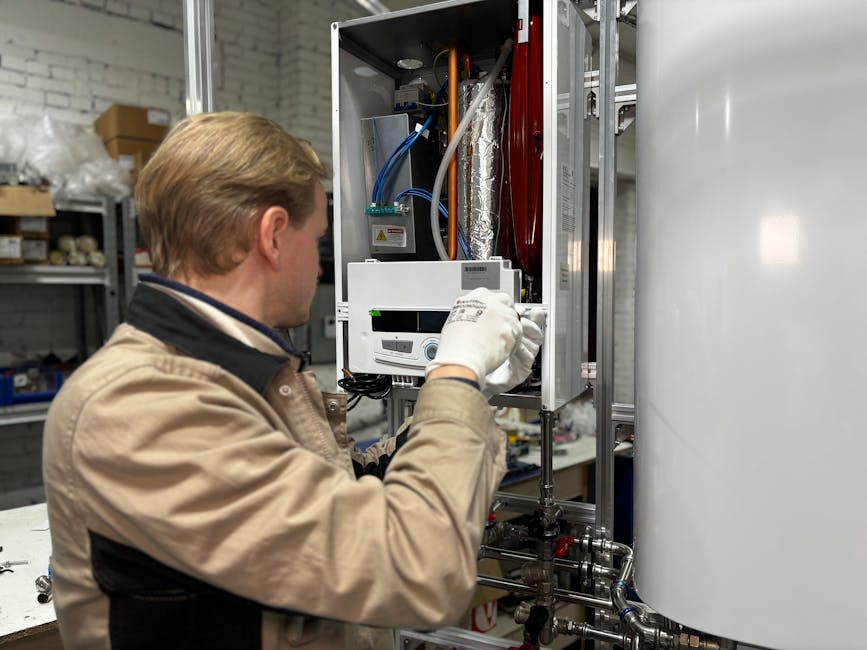Fixing That Funky AC Odor, Don't Hold Your Breath

When Your AC Smells Bad: Quick Diagnosis Guide
When your ac smells bad, your system is telling you something needs attention. Here's what different odors typically mean:
Common AC Smells and Their Causes:
- Musty/Dirty Sock Smell - Mold or bacteria on evaporator coils
- Burning/Electrical Smell - Overheating components or wiring issues
- Rotten Egg/Skunk Smell - Dead animal in ducts or gas leak
- Chemical/Vinegar Smell - Refrigerant leak
- Sewage/Garbage Smell - Clogged drain line or dry P-trap
Coming home to funky air wafting from your vents is unsettling. The good news is that most AC odors have identifiable causes and solutions. Some you can tackle yourself, while others require immediate professional attention for safety reasons.
Understanding the odor helps you decide whether it's a DIY fix or a professional call. A musty smell might just need a filter change, while a burning odor requires shutting off the system immediately. Knowing the difference is key, as some smells are simple maintenance reminders, while others signal serious health or safety risks.

A Smelly Situation: Identifying AC Odors and Their Causes
Each AC smell tells a story about what's happening inside your system. Let's decode the most common odors so you know what you're dealing with.
Musty or "Dirty Sock" Smell
This common musty or "dirty sock" smell indicates your AC needs cleaning. The main culprit is moisture mixing with dirt, creating a perfect environment for mold, mildew, and bacteria on your damp evaporator coils. A clogged condensate drain line can also cause water to back up in the drain pan, creating a breeding ground for smelly organisms. While mostly unpleasant, these odors can trigger allergies. Start by checking your air filter, but persistent smells need professional attention. Check out our guide on Fix a Frozen AC Evaporator Coil in Clovis and Why Does My AC Smell? 7 Possible Culprits for more detailed help.
Burning, Gunpowder, or Electrical Smell
A burning or electrical odor is a serious red flag that demands immediate action. Overheating motors, frayed wiring, or a malfunctioning circuit board are common sources. A burning plastic smell from melting insulation is especially dangerous. While a slight burning smell from dust on heating elements can be normal on first use, a strong or persistent odor is a serious problem.
Turn off your system at the thermostat and breaker box immediately. Do not investigate yourself. If you see smoke, evacuate and call the fire department. Once safe, call a professional for an inspection. Learn more about electrical issues at Signs Your AC Control Board Is Failing.
Rotten Egg or Skunk Smell
A rotten egg smell points to two serious possibilities. The less dangerous cause is a decomposing animal in the ductwork. The more serious concern is a natural gas leak. Gas companies add a chemical called mercaptan to natural gas to give it that distinct, attention-grabbing odor.
If you suspect a gas leak, do not use any electronics or light switches. Open windows, evacuate immediately, and call your gas company or 911 from outside your home. For more information on gas leak safety, visit Ready.gov: Gas Leaks. For a suspected dead animal, turn off the AC and call a professional for safe removal and sanitation. If you're hearing unusual sounds too, check out Why Is My AC Making a Hissing Sound.
Chemical, Acetone, or Vinegar Smell
A sweet, chemical smell, like acetone or vinegar, usually points to a refrigerant leak. Refrigerant is the chemical that cools your air. A leak not only stops your AC from cooling effectively but can also be harmful if inhaled in high concentrations, causing dizziness or nausea. You might also hear a hissing sound.
Turn off your system immediately. Refrigerant requires special handling, so call a certified technician to find and repair the leak safely. Learn more about this issue at AC Has Low Refrigerant Pressure in Clovis.
Sewage or Garbage Smell
A sewage or garbage smell can have several causes. Common culprits include a clogged condensate drain creating foul-smelling stagnant water, or a dry P-trap in your plumbing allowing sewer gases into your home. Less commonly, a sewer line breach near your ductwork could be the source. Start by running water in unused drains to fill P-traps. If the smell persists, call a professional, as sewer gases can cause health symptoms. For related water issues, see Why Is My AC Leaking Water in Fresno.
Why Your AC Smells Bad: The Role of Key Components
Understanding your AC's key components can help you pinpoint the source of bad smells. Usually, a dirty or malfunctioning part is the culprit.
How a Dirty Air Filter Makes Your AC Smell Bad
Your air filter is the first line of defense against airborne particles. When it clogs with dust and debris, airflow is restricted. This forces your system to work harder, which can cause components to overheat and create a burning smell. A dirty filter also allows dust to settle on the wet evaporator coil, promoting mold growth and musty odors. The filter can also trap household odors from cooking or smoke, recycling them back into your air.
Checking your filter monthly and replacing it every 1-3 months is the easiest way to prevent these issues.
The Evaporator Coil and Condensate Drain Connection
The evaporator coil cools your home's air, causing moisture to condense on its surface. This water drips into a drain pan and flows out through a condensate drain line. If the coil is dirty, that debris mixes with moisture to create a perfect environment for mold and bacteria. If the drain line clogs, water backs up in the pan, creating stagnant water and a breeding ground for musty smells.
Keeping the coil clean and the drain line clear is crucial for preventing odors. You can learn more about identifying these common issues by reading What Stinks? Identifying Common AC Smells.
How an Improperly Sized AC Unit Contributes to Odors
An AC unit that is too large for your home will cool the space too quickly and shut off before it can properly dehumidify the air. This process, called "short cycling," leaves excess moisture behind, creating an ideal environment for mold and mildew. An undersized unit runs constantly, putting strain on components without effectively dehumidifying either.
Proper sizing ensures your system runs in efficient cycles that both cool and dehumidify, preventing the moisture buildup that leads to odors. If you've noticed your AC turning on and off more frequently than usual, it might be a sign of sizing issues. Check out our guide on Why Is My AC Turning On and Off Rapidly to learn more.
Your DIY Toolkit: How to Safely Clean Your AC and Prevent Odors
For minor odors, some DIY maintenance can help. Always prioritize safety by turning off power to your AC at both the thermostat and circuit breaker before you begin.
Simple Steps to Eliminate AC Odors
- Change Your Air Filter: A dirty filter causes musty smells. Check it monthly and replace every 1-3 months.
- Clean the Area Around the Unit: Clear debris, leaves, and vegetation from around your outdoor unit. Ensure indoor vents are unblocked.
- Check the Condensate Drain Pan: Check the drain pan under the indoor unit for standing water, which indicates a clog. Carefully clean the pan with a mild soap or a diluted bleach solution (1 part bleach to 16 parts water).
- Clear the Condensate Drain Line: If the pan is full, the line is likely clogged. After shutting off power, locate the PVC drain line. Pour a mixture of 1/4 cup distilled white vinegar and hot water down the line to break down algae and mold. After 30 minutes, flush with hot water. Alternatively, use a wet/dry vac on the outdoor end of the line to suction out the clog.
- Open Windows for Ventilation: Open windows during milder weather to ventilate your home and air out the ducts.
- Run the Fan Mode After Cooling: Run the fan for 10-15 minutes after a cooling cycle to dry the evaporator coil and prevent mold.
The Power of Prevention: Regular Maintenance Tips
Preventing odors is always the best approach. Regular maintenance is key to keeping your AC running cleanly and efficiently.
- Schedule Professional Tune-Ups: An annual tune-up in the spring is the best way to prevent problems. A technician will thoroughly clean and inspect all components, including the evaporator coils and drain line.
- Keep Vents Clear: Ensure furniture or rugs don't block air vents, as good airflow prevents moisture buildup.
- Run the Fan After Cooling: Make it a habit to run your AC in fan-only mode after cooling cycles to dry out residual moisture and reduce the chance of mold growth.
Regular maintenance not only prevents bad odors but also improves efficiency and extends your system's lifespan. For comprehensive care, consider our AC Maintenance Fresno CA services.
When to Hang Up the Toolkit and Call a Professional
While some AC maintenance is DIY-friendly, certain odors signal dangerous or complex problems that require a professional. Attempting to fix these issues yourself can be unsafe and cause more damage. Know when to call an expert.
What Causes an AC to Smell Bad and Requires an Expert
Distinguishing between a DIY fix and a professional job is a crucial homeowner skill.
- Burning or Electrical Smells: These indicate overheating motors, frayed wiring, or circuit board issues that are serious fire hazards. Turn off your system immediately and call for help.
- Rotten Egg or Skunk Odors: This could be a dangerous natural gas leak or a dead animal in your ductwork. Both require professional handling for safety and sanitation.
- Chemical or Acetone Smells: These point to refrigerant leaks. Refrigerant is a chemical that requires certified technicians for safe handling and repair.
- Persistent Musty or Sewage Smells: If strong odors remain after you've cleaned the basics (filter, drain line), it signals a deeper issue like significant mold growth or a sewer line breach that needs expert diagnosis.
The Dangers of Ignoring a Smelly AC
Ignoring a smelly AC can lead to serious consequences for your health, safety, and finances.
- Health Risks: Mold, mildew, and bacteria can trigger allergies and respiratory problems. Fumes from burning components or refrigerant leaks are toxic.
- Fire Hazards: Electrical faults are a leading cause of house fires and should never be ignored.
- Financial Impact: A minor issue like a clogged drain can escalate into major water damage or complete system failure, turning a small repair into a costly replacement.
- Poor Indoor Air Quality: Contaminated air affects sleep, concentration, and overall comfort.
When in doubt, call us out. It's always better to have a professional tell you it's a minor issue than to find out too late you were dealing with something dangerous. For expert diagnosis and safe, lasting solutions, contact us for AC Repair Fresno CA.
Frequently Asked Questions About Smelly AC Units
Here are answers to common questions we receive about smelly AC units.
Are bad smells from my air conditioner harmful to my health?
Yes, many AC odors can be harmful. Always take persistent smells seriously.
- Mold/Mildew: Spores can trigger allergies and asthma, especially in children and the elderly.
- Burning/Electrical: These signal fire risks and can release toxic fumes.
- Rotten Egg: This could be a natural gas leak, which is an explosion and asphyxiation hazard.
- Chemical: Refrigerant leaks can cause dizziness and nausea.
If your AC has a persistent odor, it's affecting your indoor air quality. Get it checked to protect your family.
What is 'dirty sock syndrome' and how do I fix it?
"Dirty sock syndrome" is the musty smell caused by bacteria and mold growing on a damp, dirty evaporator coil. The best way to prevent it is by changing your air filter regularly and running the fan for 10-15 minutes after each cooling cycle to dry the coil. If the smell is already strong, the most effective solution is a professional coil cleaning. We include this as part of our comprehensive AC Tune-Up Clovis CA to make sure your coils stay spotless and odor-free.
How do I tell the difference between a normal 'first use' smell and a problem?
It's common to have questions about smells when first using your system for the season.
- Normal: A faint, dusty, or burning smell when you first turn on your heat is usually just dust burning off. It should disappear within an hour. A very mild musty smell from your AC on first use is also common and should clear up quickly.
- Problem: Strong, persistent, or distinct chemical odors are not normal. Burning plastic, rotten eggs, or sweet chemical smells indicate a problem that needs immediate attention.
Our rule of thumb: If you have to question if a smell is normal, turn off the system and give us a call. It's better to be safe.
Breathe Easy Again with Professional AC Service
When your ac smells bad, it's a sign that something needs attention. By identifying the odor, handling basic maintenance, and knowing when to call a professional, you can protect your system and your family's health.
Some smells are simple DIY fixes, while others, like burning or chemical odors, are your cue to call an expert. Ignoring AC odors rarely solves the problem; it often leads to bigger, more expensive issues that can impact your wallet and your family's well-being.
Since 1970, Valley Air Conditioning & Repair, Inc. has helped families throughout the Valley breathe easier, building our reputation on trust, honorable intentions, and word-of-mouth recommendations.
If you've tried the DIY steps and the smell persists, or if you've detected a dangerous odor, don't wait. Our experienced technicians have the tools and training to find the root cause and provide a lasting solution. We don't just mask symptoms; we fix what's causing your AC to smell bad in the first place.
Ready to reclaim your home's fresh, clean air? Schedule your AC Tune-Up in Fresno, CA today. We're just a phone call away, and we're ready to help you breathe easy again.




.webp)









